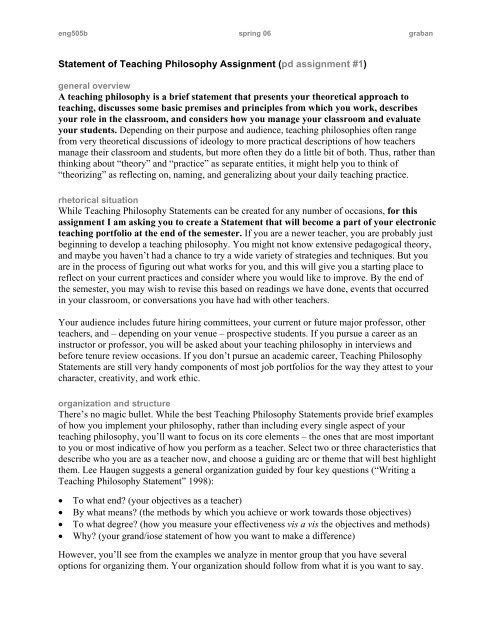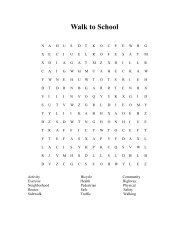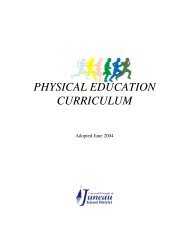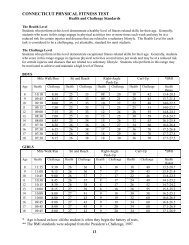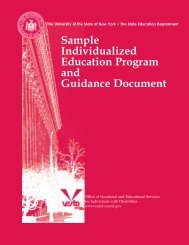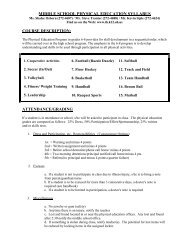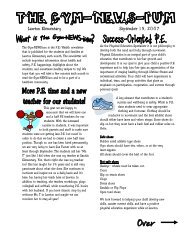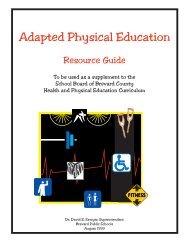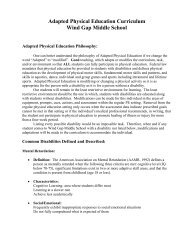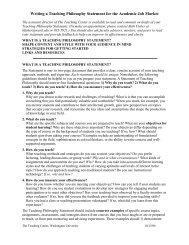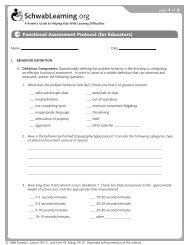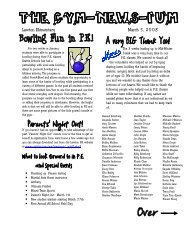teaching philosophy assignment3.pdf - thenewPE
teaching philosophy assignment3.pdf - thenewPE
teaching philosophy assignment3.pdf - thenewPE
Create successful ePaper yourself
Turn your PDF publications into a flip-book with our unique Google optimized e-Paper software.
eng505b spring 06 graban<br />
Statement of Teaching Philosophy Assignment (pd assignment #1)<br />
general overview<br />
A <strong>teaching</strong> <strong>philosophy</strong> is a brief statement that presents your theoretical approach to<br />
<strong>teaching</strong>, discusses some basic premises and principles from which you work, describes<br />
your role in the classroom, and considers how you manage your classroom and evaluate<br />
your students. Depending on their purpose and audience, <strong>teaching</strong> philosophies often range<br />
from very theoretical discussions of ideology to more practical descriptions of how teachers<br />
manage their classroom and students, but more often they do a little bit of both. Thus, rather than<br />
thinking about “theory” and “practice” as separate entities, it might help you to think of<br />
“theorizing” as reflecting on, naming, and generalizing about your daily <strong>teaching</strong> practice.<br />
rhetorical situation<br />
While Teaching Philosophy Statements can be created for any number of occasions, for this<br />
assignment I am asking you to create a Statement that will become a part of your electronic<br />
<strong>teaching</strong> portfolio at the end of the semester. If you are a newer teacher, you are probably just<br />
beginning to develop a <strong>teaching</strong> <strong>philosophy</strong>. You might not know extensive pedagogical theory,<br />
and maybe you haven’t had a chance to try a wide variety of strategies and techniques. But you<br />
are in the process of figuring out what works for you, and this will give you a starting place to<br />
reflect on your current practices and consider where you would like to improve. By the end of<br />
the semester, you may wish to revise this based on readings we have done, events that occurred<br />
in your classroom, or conversations you have had with other teachers.<br />
Your audience includes future hiring committees, your current or future major professor, other<br />
teachers, and – depending on your venue – prospective students. If you pursue a career as an<br />
instructor or professor, you will be asked about your <strong>teaching</strong> <strong>philosophy</strong> in interviews and<br />
before tenure review occasions. If you don’t pursue an academic career, Teaching Philosophy<br />
Statements are still very handy components of most job portfolios for the way they attest to your<br />
character, creativity, and work ethic.<br />
organization and structure<br />
There’s no magic bullet. While the best Teaching Philosophy Statements provide brief examples<br />
of how you implement your <strong>philosophy</strong>, rather than including every single aspect of your<br />
<strong>teaching</strong> <strong>philosophy</strong>, you’ll want to focus on its core elements – the ones that are most important<br />
to you or most indicative of how you perform as a teacher. Select two or three characteristics that<br />
describe who you are as a teacher now, and choose a guiding arc or theme that will best highlight<br />
them. Lee Haugen suggests a general organization guided by four key questions (“Writing a<br />
Teaching Philosophy Statement” 1998):<br />
• To what end? (your objectives as a teacher)<br />
• By what means? (the methods by which you achieve or work towards those objectives)<br />
• To what degree? (how you measure your effectiveness vis a vis the objectives and methods)<br />
• Why? (your grand/iose statement of how you want to make a difference)<br />
However, you’ll see from the examples we analyze in mentor group that you have several<br />
options for organizing them. Your organization should follow from what it is you want to say.
length<br />
Most Teaching Philosophy Statements run between one and two pages. I’m asking for 1 page,<br />
single-spaced, with 11 or 12-point legible font, and 1” margins on all sides. If you would like<br />
to write more, please feel free to do so, but please do not exceed 2 single-spaced pages.<br />
brainstorming<br />
I recommend brainstorming to get you started, particularly if you are trying to determine what<br />
information to prioritize. The following questions might help:<br />
• How did you become interested in <strong>teaching</strong>? Who were/are your major pedagogical<br />
influences?<br />
• What’s important to you in your <strong>teaching</strong>?<br />
• What do you want to get out of <strong>teaching</strong> writing/out of <strong>teaching</strong> English 106?<br />
• What do you want your students to get out of a writing class/out of English 106?<br />
• What does it mean to you to “teach writing”? What central point of dissonance reminds you<br />
of what it’s about and how do you in your <strong>teaching</strong> address that point of dissonance?<br />
• Is there an especially relevant moment (an activity, discussion, or assignment) from your<br />
class that you could unpack as a way of explaining how you think a particular concept should<br />
be taught? What made that activity, discussion, or assignment go well?<br />
• How would your students/mentors describe you as a teacher?<br />
• How do you establish rapport in your classes?<br />
• How do you go about motivating students?<br />
• How do you evaluate/grade/respond to students?<br />
additional resources (if you need them)<br />
• Center for Excellence in Learning and Teaching<br />
“Writing a Teaching Philosophy Statement” (1998) by Lee Haugen<br />
http://www.celt.iastate.edu/<strong>teaching</strong>/<strong>philosophy</strong>.html<br />
• Office of Faculty and TA Development, The Ohio State University.<br />
“Writing a Philosophy of Teaching Statement”<br />
http://ftad.osu.edu/portfolio/<strong>philosophy</strong>/Philosophy.html<br />
• “Developing a Philosophy of Teaching Statement” (1998) by Nancy Van Note Chism<br />
http://www.cofc.edu/~cetl/Essays/DevelopingaPhilosophyofTeaching.html<br />
eng505b spring 06 graban


